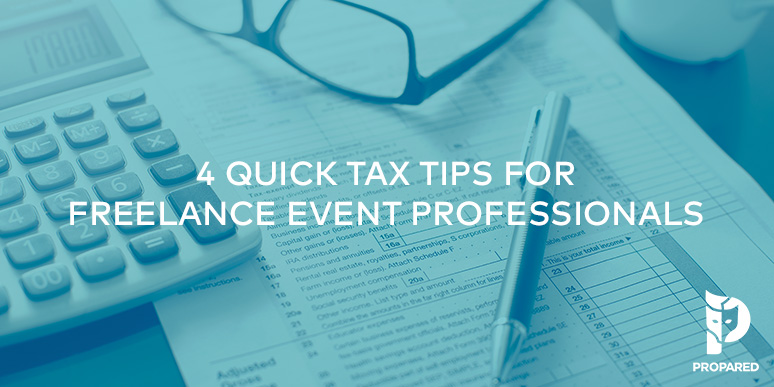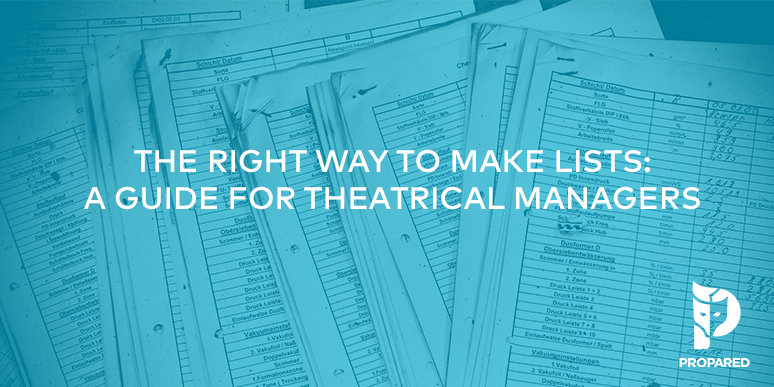
It’s tax time! Well, technically, it’s been tax season for a few months. But maybe you’re still scrambling to get your return filed. Or maybe you’re one of the more than 13 million people who regularly file for extensions. And I’m just speculating here but from personal experience, I’m sure there’s a fair number of people who work in events who fall into this latter category.
(UPDATE: For those of you frantically trying to meet the April 15 deadline, did you know you have 3 extra days this year? Tax filings aren’t actually due until the 18th!)
Why is that? Well, for one thing, many event planners work for themselves. Or at the very least, can point to multiple projects with differing employment agreements, retainers, and contracts over the year. Either way, you’re looking at more paperwork and more complicated filings. I know a production manager who worked for some 20 different companies last year. Yikes.
But not too worry. There are plenty of resources out there that can help show you how to do your taxes as a freelancer. All you need is a little context about where to start.
(Disclaimer: I’m no tax professional. I’m just another event manager like you who has spent years figuring out how to pay my bills, grow my business, and build a safety net. When in doubt, I always defer to my awesome accountant, who has kindly answered every dumb question I’ve had over the years and taken the time to educate me a bit along the way.)
1. Find a Professional
Are you having a, “Duh” moment? It seems pretty obvious; hire a professional to help. So why bother putting this tip here? Well, you’d be surprised how many people choose to go it alone when it comes to filing taxes. Tax preparation software continues to get better but the IRS still estimates that it holds $1 billion (with a B) in unclaimed refunds every year. It’s a serious question to consider: just because you CAN do your own taxes, should you?
There are a lot of benefits to hiring an accountant. Look at it like any other trade. They are professionals who’ve spent their entire adult lives learning how to navigate the complex and ever-changing tax code. Why not trust them the same way you’d trust a designer to help you plan decór? Or an AV pro with your sound installation? Look at it this way. Even if you’re pretty good at it, you can still pass off the nitty gritty work. Use your knowledge to help expedite the filing process. Provide context for your professional that he or she can pair with corresponding tax law. There are even accountants who specialize in freelance filings. Tap this resource and get back to planning your events.
2. Learn Your Deductions
Filing taxes as an independent contractor is like walking a tightrope. Lean too far in one direction and you’re going to fall. As a freelancer, you need to be extremely careful about what you claim in relation to your business. Claim too much and you’re asking for an audit. But claim too little, and you are leaving a lot of money on the table that should be in your bank account, accruing interest.
Your actual deductions will depend on your particular circumstances. But generally speaking, if you purchase something for work, you can deduct at least a portion of it. Tools, required clothing, client meals, gifts, portions of your internet and phone bills, etc. First, make an itemized list of your work-related purchases. Then, determine what was either, as the IRS calls it, “ordinary and necessary” to determine what’s deductible.
3. Keep Detailed Records
The only way to get to a good place with your deductions is to get a little obsessive. Keep track of every day you work, including hours and expected paydays. Keep your receipts, all of them. Even better, sort them during the year, based on the categories and deductions you’ve pre-defined from the previous year’s filing. Then, come April, even the most convoluted set of records can be easily passed off to your accountant.
Additionally, take pictures of timesheets. Save emails with contract terms so that you have proof to point to should a discrepancy arise. Because one will. Assume that any company you freelance with is engaged with dozens or more just like you. Expect them to make mistakes. You take responsibility for when you expect to be paid. This way, you can follow up if and when it doesn’t happen.
4. Save, Save, Save
Every time I speak with another event manager about savings, we immediately think back, not so fondly, to 2008. Clients’ budgets, especially for producing events seemed to disappear and a lot of good folks lost businesses during this time.
What’s even more shocking is that nearly 8 years later, the average American’s relationship to saving money hasn’t fundamentally changed. An event professional should be more conscious of saving than anyone. Forget widespread recession. A particularly slow event season could undo years of hard work.
On top of that, building a safety net is more than just planning for the future. Freelancers are often on contracts and receiving 1099s from employers. That is, you are getting paid with no tax withholding. You’ve still got to pay it. But again, the responsibility is on you, not an employer. If you didn’t account for it, you might suddenly find yourself going into debt. Just to pay a tax bill!
It’s a safe bet to stash ⅓ of every paycheck in preparation for your tax bills. Why? As an independent contractor, you’re going to have to make quarterly tax payments based on the previous year’s income. By setting aside some funds, you can easily make these “estimated tax” payments and avoid penalties levied by the IRS.
Be diligent. Go as far as setting up a separate bank account just for your tax payments. If you know a good money manager, you can leverage these deposits in short term investments to potentially earn a bit before your bill comes around.
Tax season is never fun. Invariably, something or other will have happened along the way to make this time stressful. Maybe you’re right in the middle of producing an event! Talk about the best and worst of times. But there are some simple things you can do during the year – hiring a professional, educating yourself, getting organized, and making some financially frugal decisions – that can make it a bit less overwhelming. Good luck!
Got tax advice or tips for freelance event planners? Share them with us in the comments below.



